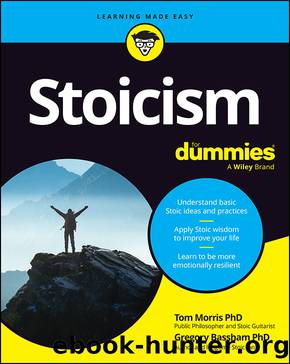Stoicism For Dummies by Tom Morris & Gregory Bassham

Author:Tom Morris & Gregory Bassham [Morris, Tom & Bassham, Gregory]
Language: eng
Format: epub
ISBN: 9781394206292
Publisher: Wiley
Published: 2023-12-11T00:00:00+00:00
As we noted in the Introduction, in recent decades thereâs been a major revival of Stoicism. As we shall see, however, current versions of Stoicism often differ in major ways from ancient Stoicism. One big difference involves natural law. Nearly all leading modern Stoics either quietly ignore or reject natural law, and many state that ethics is a purely human invention, answerable to no natural or higher law.
In ancient Stoicism, natural law has its source in the reason and will of the Logos. Its principles were thought to have the force of law because they were commands issued by a wise and good Lawgiver and Ruler of the universe. Many modern Stoics reject the concept of natural law because they deny the existence of a God or any kind of higher power. So, Lawrence E. Becker, author of A New Stoicism (rev. ed. 2017), argues for a thoroughly secular form of Stoicism that rejects all ancient Stoic cosmology and theology and places ethics on a purely humanistic basis. William B. Irvine, author of A Guide to the Good Life (2009), offers a âmodernizedâ version of Stoicism based in evolutionary science, not religion. And in his A Field Guide to a Happy Life (2020), Massimo Pigliucci proposes a version of Stoicism he calls Stoicism 2.0 that rejects any notion of God and sees ethics entirely as a human invention.
There are advantages to dropping all talk of God and natural law from Stoicism. Stoicism has wider appeal if it can formulated in a way that can be accepted by religious believers and doubters alike. And the idea of natural law is controversial both because it presupposes the existence of God and because, as we shall soon see, there are problems with treating ânatureâ as a moral standard. But without God, many key Stoic ideas, such as providence, fate, radical acceptance, an afterlife, universal moral law, and a cosmopolitan kinship and citizenship based on a shared âdivinity within,â appear to be ungrounded. What emerges seems to be a very stripped-down Stoicism with a very different flavor.
Download
This site does not store any files on its server. We only index and link to content provided by other sites. Please contact the content providers to delete copyright contents if any and email us, we'll remove relevant links or contents immediately.
The remains of the day by Kazuo Ishiguro(7623)
Tools of Titans by Timothy Ferriss(7020)
The Black Swan by Nassim Nicholas Taleb(6258)
Giovanni's Room by James Baldwin(5966)
Inner Engineering: A Yogi's Guide to Joy by Sadhguru(5945)
The Way of Zen by Alan W. Watts(5843)
The Six Wives Of Henry VIII (WOMEN IN HISTORY) by Fraser Antonia(4826)
The Power of Now: A Guide to Spiritual Enlightenment by Eckhart Tolle(4805)
Astrophysics for People in a Hurry by Neil DeGrasse Tyson(4652)
Asking the Right Questions: A Guide to Critical Thinking by M. Neil Browne & Stuart M. Keeley(4641)
12 Rules for Life by Jordan B. Peterson(3795)
The Ethical Slut by Janet W. Hardy(3547)
Skin in the Game by Nassim Nicholas Taleb(3515)
Housekeeping by Marilynne Robinson(3454)
The Art of Happiness by The Dalai Lama(3420)
Double Down (Diary of a Wimpy Kid Book 11) by Jeff Kinney(3314)
Skin in the Game: Hidden Asymmetries in Daily Life by Nassim Nicholas Taleb(3302)
Walking by Henry David Thoreau(3261)
12 Rules for Life: An Antidote to Chaos by Jordan B. Peterson(3222)
